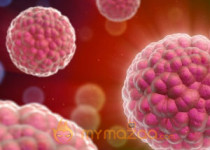Scientists at Duke University have developed an antibody that targets cancer cells and triggers an immune response to kill tumors while leaving other cells unharmed. The emerging approach to cancer treatment holds promise as an alternative to existing immunotherapies that pose unwanted side effects, researchers said.
The paper, published Thursday in Cell Reports, is the latest in a series of studies by the team, whose earlier research suggested the antibody helped halt progression of early-stage lung cancer. In subsequent research, they observed that a human-derived, purified antibody kills tumor cells when bound to a specific target, a protein called complement factor H (CFH), which protects cells from an immune system attack.
“[In] this last study— what I consider the most important and interesting— we did something nobody has done before,” senior author Dr. Edward F. Patz, Jr. the James and Alice Chen Professor of Radiology and professor in the department of pharmacology and cancer biology at Duke, told FoxNews.com. “We took cells to make the antibody and figured out the secrets of the antibodies they’re making.”
Researchers extracted the white blood cells from patients who made the antibody, sequenced the antibody genes, and cloned them to make mature antibodies. The antibody was then tested in multiple cancer cell lines, including lung, gastric and breast cancers in lab dishes and in tumors in living mice. Researchers observed that the antibodies inhibited tumor growth without obvious side effects.
The antibody, researchers believe, only recognizes the structurally different part of CFH protein that they believe is only found in tumor cells. It then impacts tumor growth by disabling the protective CPH layer and destroying cancer cells. They don’t necessarily want the antibody to kill all the tumor cells, though, Patz noted.
“More important is what we’re finding is that it kills enough tumor cells to hold the tumor in check,” he said. “What we’re working on now is to show it allows more immune cells to come in and take over.”
Patz said it appears the antibody helps initiate the body’s native immune response— the researchers’ goal— so it kills the rest of the tumor cells.
Chemotherapy, on the other hand, is usually toxic to any dividing cells, including healthy ones, which leads to side effects. Plus, even if chemotherapy eliminates tumors, there may still be tumor cells left that will likely replicate, but the drug will no longer be in the body to kill the cancer cells. Using the antibody to activate the immune system means that, even when the antibody is no longer in the body, the body itself can have anti-tumor activity, Patz said.
So far, researchers have tested mice with five doses of the antibody, which resulted in slowing of tumor growth. The proper dosing schedule hasn’t yet been determined, but the current study showed that killing a tumor is possible.
“All we wanted was a signal, and we got a very, very clear signal,” Patz said. “In every cell line and animal model, it very consistently showed the effects of inhibiting tumor growth and killing tumor cells.”
The technique of human-derived antibodies was first designed to use with HIV patients, to find antibodies for infectious disease.
“We’re the first group to use it for cancer,” Patz said. “Everybody told us we couldn’t do it.”











